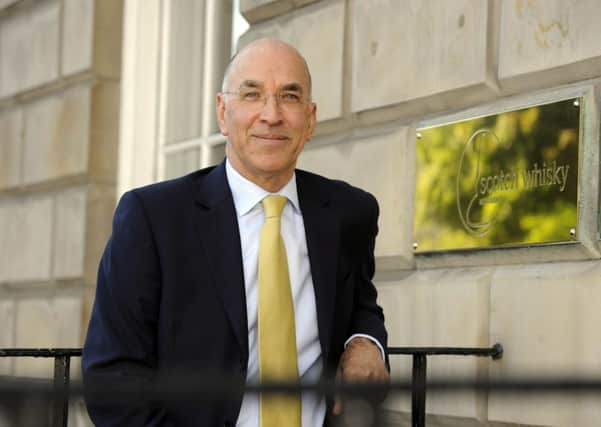SNP MP accused of trying to silence businesses


Angus Robertson attempted to “neuter” business opinion, according to a former whisky industry chief, who said firms feared they could face “retribution down the track”.
However, the Moray MP, whose constituency takes in much of Scotland’s whisky trail, has denied the claims made by former Scotch Whisky Association (SWA) boss Gavin Hewitt.
Advertisement
Hide AdAdvertisement
Hide AdPrime Minister David Cameron warned last week that firms who spoke out suffered intimidation at the hands of the SNP administration.
Now Mr Hewitt has claimed in a Dispatches programme for Channel 4 – called the Great British Break-up? – that he or senior members of his staff met Mr Robertson on at least six occasions over the past two years. “He and the SNP have regularly tried to get the message to the Scotch Whisky Association that the Scotch whisky industry should stay out of the independence debate,” Mr Hewitt said.
“He was, I think, trying to neuter business comment. There was a genuine fear that, in fact, if we were seen to scupper by coming out publicly against independence, there would be retribution down the track.
“Regardless of whether the SNP win or lose the referendum vote in September, they will be in power for many years to come and that those people who have stood against them or worked against the central plank of their policy, independence, will be singled out and will be remembered.”
A spokeswoman for Deputy First Minister Nicola Sturgeon insisted Mr Hewitt’s claims about Mr Robertson were “utterly false”.
She said: “His meetings with Gavin Hewitt and others from the SWA have all happened in the company of colleagues and none involved an unaccompanied meeting with Mr Hewitt.”
The programme, to be screened tonight, contacted 50 companies and business leaders believed to have concerns over independence. Five said privately they had been contacted by the Scottish Government and that they felt pressured to stay quiet about their views.
Advertisement
Hide AdAdvertisement
Hide AdOf the five, one claimed they had been visited by a minister, two said they had had a phone call from a minister, and two told how they had received a call from First Minister Alex Salmond’s office.
Scottish Conservative chief whip John Lamont said: “These revelations won’t come as a surprise to those who’ve found themselves on the wrong end of an SNP tirade, and everyone from the First Minister down is guilty of this kind of behaviour.
“Everyone in Scotland has a legitimate voice in this, and the Scottish Government using its position to breathe down the neck of everyone who dares disagree is frankly appalling.”
The Dispatches programme also examines the pressure that public bodies came under from the SNP government to quit business organisation the CBI after it decided to publicly back a No vote.
This led to many members, including the broadcaster STV and several universities, to pull out because they wanted to remain politically neutral.
But the programme says it has obtained e-mails that reveal how finance secretary John Swinney’s office seized on the decision by Scottish Enterprise to pull out to press others to do the same. His media adviser urged VisitScotland to follow Scottish Enterprise’s lead, the programme says.
One e-mail states: “Mr Swinney has said that other public bodies should follow suit, if they are CBI members.”
Another senior official in the finance department e-mailed the chief executive of VisitScotland, asking him: “Can you please let me know…when a resignation letter can be issued.”
Advertisement
Hide AdAdvertisement
Hide AdBut the spokeswoman for the Deputy First Minister said Mr Swinney’s comments “were in the context of the CBI” taking “a political stance” that raised “questions as to whether public bodies could remain members of the CBI and continue to meet their statutory obligation of impartiality”.
The claims of attempts to stifle opinion come after a Nobel prize-winning scientist urged the Scottish and UK governments to pledge that academics who enter the independence debate will not be penalised for expressing their views.
Sir Paul Nurse claimed academics were reluctant to speak out for fear of losing government funding.
In tonight’s programme, Lord Sutherland, a former vice-chancellor of Edinburgh University, said some of those running Scottish universities had also come under pressure to stay out of the debate, despite concerns about the impact of independence.
Lord Sutherland said: “To be questioned by a Scottish minister about the propriety of his expressing views in public is disgraceful. It sends the message that you’re being watched; if Big Brother’s looking down on you, then there’s an implicit threat.
“The danger is that you have a regime that does things by stealth rather than argues things out in public.”
But writing in The Scotsman today, the principal of the University of Glasgow has sought to “counter that impression”.
Anton Muscatelli writes: “No-one, on either side of the debate, has tried to intimidate, bully or silence me, my university or the dozens of academics playing an active role in the campaign.”
Advertisement
Hide AdAdvertisement
Hide AdIn a letter to The Scotsman, three members of Academics for Yes, Professor Bryan MacGregor, Prof Mike Danson and Dr Stephen Watson, said they disagreed “fundamentally” with the views expressed by Sir Paul Nurse, Lord Stern and Sir John Tooke about the potential impact of independence on university research.
They write: “Rather than cause any damage, we are certain that an independent Scotland will be better placed economically to support its universities.”